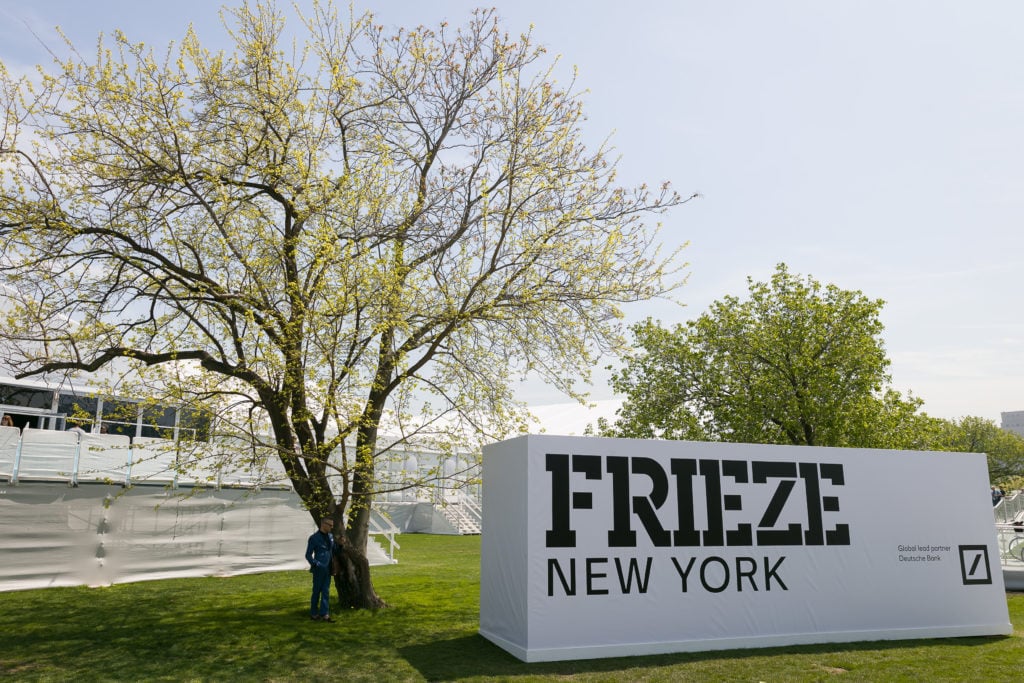Art Fairs
Frieze Expands Its American Footprint, Buying Up the Armory Show and Expo Chicago
The stalwart U.S. art fairs will keep their own names and teams following the acquisitions.

The stalwart U.S. art fairs will keep their own names and teams following the acquisitions.

Vivienne Chow

The international art fair Frieze is set to expand its footprint in the U.S. On Thursday, the fair announced that it would acquire the Armory Show in New York and Expo Chicago. According to the press statement, the two fairs will continue operations with their existing names and teams, but further details about the nature of the deals were not disclosed.
It is a brave move for the London-based Frieze, which has already been running Frieze New York and Frieze Los Angeles, to acquire two of the longest-running art fairs in the U.S. The acquisitions raise eyebrows over the future of London in the post-Brexit era, given that some art market players are already shifting their focus away from the U.K. capital.
Frieze said in a statement that it has acquired the Armory Show, which takes place annually in September, and inked a deal to buy Expo Chicago, which usually takes place in mid-April. “These acquisitions mark a transformational moment in Frieze’s growth and allow us to extend the depth and breath of our presence in the U.S.—the world’s leading art market,” Frieze CEO Simon Fox said in a statement.
“New York and Chicago each have their own distinct ecosystem of artists, galleries, museums, and collectors,“ he added. “By expanding our presence in both cities, we will build on the strong track record we have established in the U.S. at Frieze New York and Frieze Los Angeles.” The fair stated that it plans to continue operating Frieze New York.
Following the acquisitions, Nicole Berry, executive director of the Armory Show, which was founded in 1994, and Tony Karman, founder, president and director of Expo Chicago, founded in 2012, will be working alongside the international team of Frieze directors across all existing fairs under the new structure.
Berry said that joining Frieze would allow the nearly three-decade-old Armory Show to grow even further in the long-run. “Joining Frieze enables us to leverage a respected brand, deep industry knowledge, expanded resources, and a larger network, which will further enhance the experience for our exhibitors and visitors alike,” she said in a statement. Karman said joining Frieze will help to strengthen Expo Chicago’s impact.
The move came as a surprise to many. Still, Thomas Stauffer, art advisor and co-founder of the Zurich-based Gerber & Stauffer Fine Arts, pointed out that the acquisitions were a strategic move to assert Frieze’s dominance in North America that made good sense, especially after Hollywood agency Endeavor acquired a 70 percent stake in the company that owns the Frieze entity, including the fairs and publications, in 2016.
“For other fair organizers, it will be very difficult to compete in the U.S. With four major fairs in the U.S. organized by Frieze alone, the pressure on Art Basel Miami Beach most definitely will be increasing,” Stauffer told Artnet News. “The U.S. is the world’s most important art market today and the acquisitions of the two fairs by Frieze is a clear statement. The Frieze management believes in a strong future of the American art market.”
International art fair operators have been making big moves in recent years in a bid for global domination: Frieze ventured into Asia in 2022 with an inaugural edition of Frieze Seoul, which will be returning for a second edition in September. That same year, Art Basel launched Paris+. Both new initiatives met with positive responses.
Art Basel’s parent company, Swiss fair giant MCH, canceled the long-running Masterpiece London this year, which it had acquired piece-by-piece between 2017 and 2022, citing the lack of European exhibitors returning to the fair due to increased costs and paperwork involved post-Brexit.
The June slot was taken over by a new local fair, Treasure House Fair, founded by the original founders of Masterpiece, but that show, conceived in just four months, was operating on a much smaller scale. E.U.-based galleries were scarce.
Stauffer did not expect that more American fairs will be taken over by European fair organizers, simply because there aren’t many fairs left that are significant. However, in Europe, matters could be different, he speculated. “For the European market, we could see in the next 12 to 18 months on the mid- and small-scale level of art fairs, acquisitions or mergers.”
But with five major fairs in the U.S. including those under the Frieze umbrella and Art Basel Miami Beach, Stauffer also predicted that North America-based collectors might feel that they do not need to travel to Europe for fairs anymore. “The European art fair organizers have to work extra hard in order not to lose their collectors from the U.S.,” he noted.
More Trending Stories:
An Israeli First-Grader Stumbled on a 3,500-Year-Old Egyptian Amulet on a School Trip